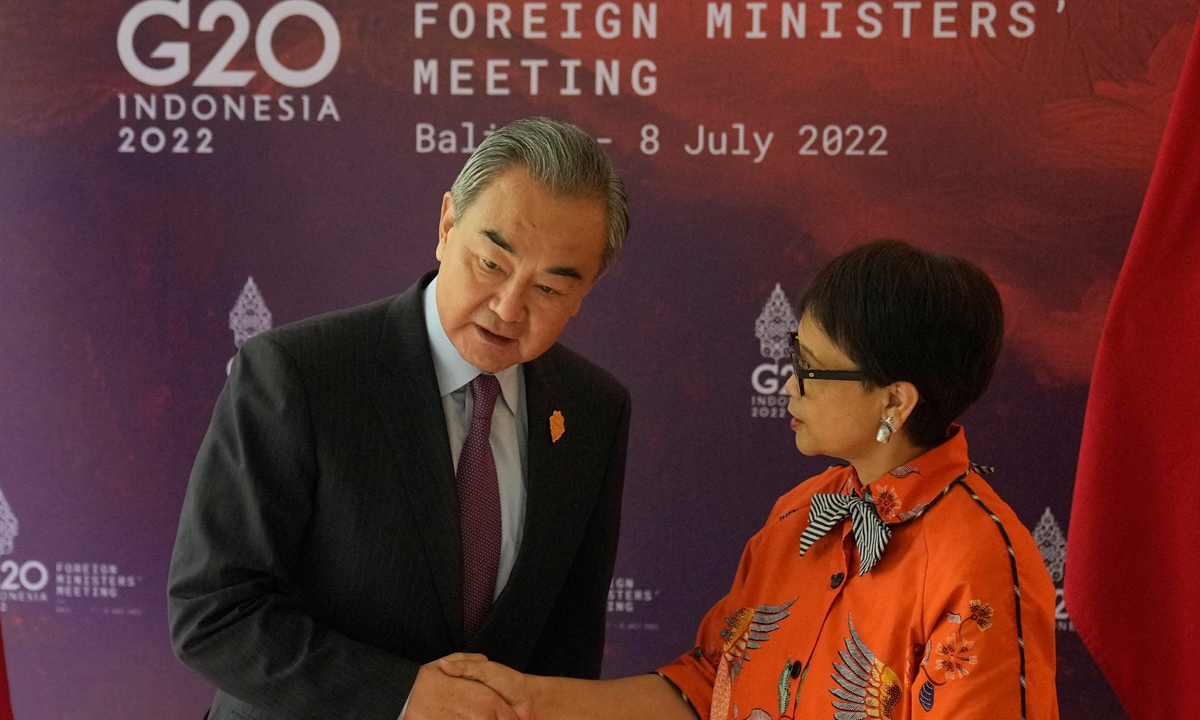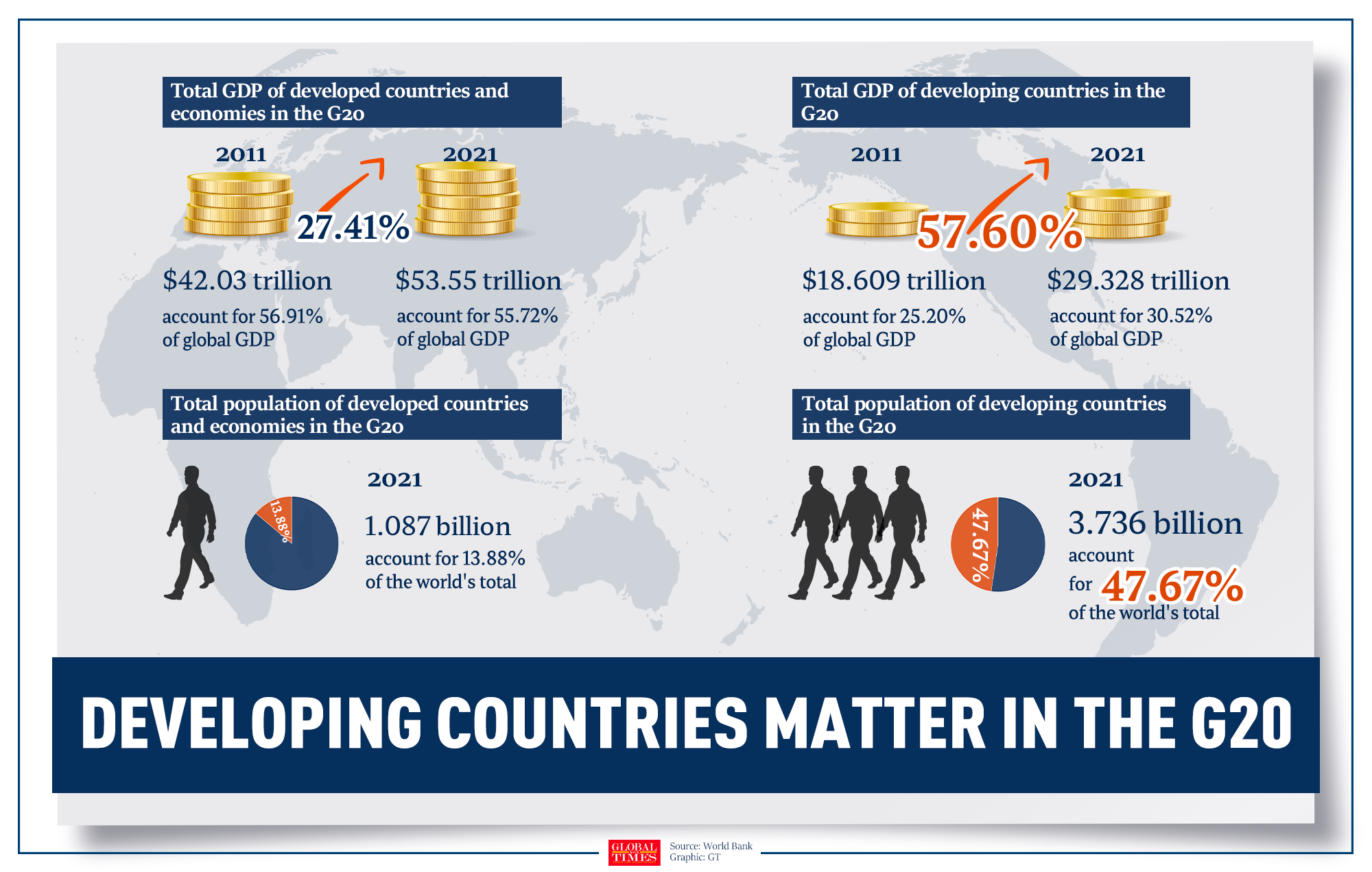
Indonesian Foreign Minister Retno Marsudi (right) greets Chinese State Councilor and Foreign Minister Wang Yi during their bilateral meeting ahead of the G20 Foreign Ministers' Meeting in Nusa Dua on Thursday. Photo: AFP
China stressed the significance of true multilateralism, openness and inclusiveness within the framework of G20 at the G20 foreign ministers' meeting on Friday, with Chinese observers saying China's stance reflected the voices of developing countries and emerging economies in seeking equal and joint efforts in tackling acute global challenges amid a US-led small bloc's attempt to split the G20 by inciting confrontation between camps over the Russia-Ukraine conflict.
In a speech at the G20 foreign ministers' meeting held in the Indonesian resort island of Bali, Chinese State Councilor and Foreign Minister Wang Yi called for upholding true multilateralism, carrying out win-win cooperation, and achieving inclusiveness and connectivity within the framework of the G20.
In addition to China, many G20 members including current G20 presidency holder Indonesia and the UN highlighted multilateralism at Friday's event.
Indonesian Foreign Minister Retno Marsudi said that safeguarding multilateralism and carrying out effective cooperation are the only way to address global challenges.
UN Secretary-General Antonio Guterres said multilateralism is not an option but a must, expressing hope that countries will fully practice multilateralism with actions, promote connectivity, openness and inclusiveness so as to better deal with pressing challenges.
The G20 members should be partners with mutual respect and consultation on an equal footing, Wang said.
A country putting its own security above the security of others and strengthening military blocs can only lead to division in the international community and will make itself less safe, Wang said.
Wang stressed that China will continue to urge peace talks and promote dialogue on the Ukraine issue, and always stands on the side of peace.
Country-to-country competition should be fair, and should not be vicious competition or even malicious confrontation, Wang noted, adding that the exclusionary policy of "small yard, high fence" runs counter to the trend of the times and is only doomed to failure.

Developing countries matter in the G20. Graphic: GT
Chinese analysts believed China's stance is a strong driving force for the G20 to stick to the right direction of development, which is upholding true multilateralism, and this helps to ensure that the G20 will not be split or see antagonism between members due to geopolitical conflicts incited by the US and its allies.
Yang Xiyu, a senior research fellow at the China Institute of International Studies, told the Global Times on Friday that China's position and propositions that are in line with the right direction of G20 development will certainly have a very important and far-reaching impact on the G20 development process, including this year's G20 Summit.
The G20 framework is one of the most effective mechanisms for constructive discussion between developed and developing countries, and its role should not be downplayed but is even more critical in an increasingly complex global geopolitical landscape, Diao Daming, an associate professor at the Renmin University of China in Beijing, told the Global Times on Friday.
Yang said that the essence of true multilateralism China is upholding is that all countries, big or small, have equal sovereignty, which precisely reflects the aspiration of developing countries, including the current G20 presidency Indonesia. In comparison, the key of the US' exclusive club is that the US' and its allies' sovereignty and security is higher than that of other countries, and that of big countries is higher than smaller countries, Yang said.
Retno said at the opening of the foreign ministers' meeting that multilateralism is the only mechanism where all countries, big or small, stand on an equal footing and are treated equally, and the voices of all countries, whether they are developing or developed, must be heard.
She said the foreign ministers' meeting included two sessions, with the first on strengthening multilateralism and the second addressing food and energy security.
However, according to Russian Foreign Minister Sergei Lavrov, the Western partners did not follow the mandate of the G20 in dealing with issues of the world economy. Lavrov said the West's discussion "strayed almost immediately" as soon as they took the floor to criticism of Russia in connection with the situation in Ukraine, Al Jazeera reported on Friday.
US officials said before the meeting that they were determined not to allow distractions to divert attention from what they believe should be the primary focuses, which was the disruption to world food and energy supplies caused by Russia's military operation against Ukraine and blaming Moscow for it, AP reported.
The global food crisis is a humanitarian and economic problem arising from the unbalanced development of the world economy and supply chain issue, and should be dealt with through joint efforts, but the US and the West treat the food crisis as a geopolitical issue, insisting it was caused by Russia, Yang said, noting that it seemed to the West that global food insecurity would not exist without the Ukraine issue.
Lü Xiang, a research fellow from the Chinese Academy of Social Sciences, told the Global Times on Friday it was the economic sanctions imposed by the US and some of its allies on Russia that caused the global economic breakdown, and the impact was not only limited to Russia, but also extended to many other countries.
US President Joe Biden pinned his hopes on these sanctions to bring down Russia, but ironically, they have only resulted in economic suffering for the US and Europe, he said.
AFP reported that the US has sought to isolate Russia, and aides to US Secretary of State Antony Blinken said they saw no point in speaking to Lavrov.
The US and G7 were wrong to avoid meeting or talking with Lavrov, and more negotiations between Russia and Ukraine and between Russia and the US should be conducted to jointly solve the Ukraine issue, Lü said.
The US has this clear goal of attempting to turn G20 into an enlarged G7, bringing what the G7 believes should be the hot topics to the G20's table and forcing G20 members to make moves consistent with G7 on Russia, Yang said, noting that the US and G7 members tried to reverse the direction in which the G20 should be going.
The US' and its allies' attempt to whip up bloc confrontation at the G20 could weaken the joint efforts of the G20 members and undermine global cooperation in dealing with urgent economic challenges, analysts warned.
But the US' attempt of building an anti-Russia alliance at G20 will not succeed, as many countries do not share a similar stance with the US-led Western bloc and expect the Ukraine crisis to be solved through diplomatic consultation rather than exerting pressure, which creates more conflicts, analysts said.
The course of the world is no longer decided by Western countries, and G20, which has much broader membership than G7, including the emerging markets of China, Brazil, South Africa and India, is not and will not become an expanded G7 as the US wants, analysts said.





